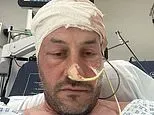The Yorkshire man marathon showcases inspiring feats of endurance and resilience, as exemplified by George Wade, a remarkable brain tumor survivor. At just 41 years old, this Thirsk resident defied the odds by completing the London Marathon 2023 in an astonishing three hours and 16 minutes, less than a year after tumors threatened his mobility. His journey from facing terminal illness to achieving such an incredible marathon time has galvanized the Yorkshire running community, telling a tale that runs deeper than just fitness but also touches on the challenges of battling cancer. As we explore inspiring marathon stories like his, we come to appreciate not just the athletic prowess of individuals but their unwavering spirit and determination to thrive despite adversity. The interplay of cancer and fitness becomes a beacon of hope in the marathon world, reminding us of the power of perseverance.
The Yorkshire man marathon reflects an extraordinary commitment to long-distance running, epitomized by courageous individuals like George Wade. At the age of 41, this resident of Thirsk triumphed over two debilitating brain tumors to complete the iconic London Marathon 2023 with remarkable determination. His inspiring marathon story reveals a profound journey not only in the realm of sports but also in the battle against illness, showcasing the strength of the local running community in Yorkshire. The convergence of health challenges and athleticism demonstrates how individuals can find purpose and motivation in the face of adversity, turning their struggles with cancer into incredible achievements. Such narratives highlight how fitness can serve as both a therapeutic outlet and a pathway to resilience.
The Journey of a Yorkshire Man Marathon Finisher
George Wade’s incredible journey began with a shocking diagnosis of two brain tumors, which he faced with remarkable resilience. Despite being a Yorkshire man with terminal illness, he demonstrated an unwavering spirit by training for and completing the London Marathon. This event was more than just a race for George; it symbolized his battle against cancer and his remarkable comeback after losing the ability to walk. The timing of his achievement is nothing short of inspiring, highlighting how the human spirit can prevail even in the most daunting situations.
His journey has resonated deeply with the Yorkshire running community, encouraging many people to motivate themselves and others facing health challenges. George’s story amplifies the idea that fitness and healing can go hand in hand, acting as both mental and physical therapy. As he crossed the finish line of the London Marathon, it wasn’t just a testament to his physical tenacity; it was also a beacon of hope for others living with cancer and those who have faced similar struggles.
Inspiration from George Wade’s Marathon Story
George Wade’s experience as a brain tumor survivor highlights the power of determination and community support. His completion of the London Marathon 2023 serves as a source of inspiration, showing that even the harshest plight can lead to positive outcomes. George’s journey encourages others to share their inspiring marathon stories, creating a supportive network where athletes and cancer survivors can thrive together. His narrative is one of hope—proof that physical fitness is a fighting chance against the trials life throws our way.
Moreover, Wade’s determination to conquer the marathon after treatment underlines an important message about the significance of fitness in recovery from illnesses like cancer. His high-profile achievement during the London Marathon raised awareness within the cancer community about the importance of physical activity, fostering a dialogue about how fitness can serve as a complementary approach to traditional cancer treatments. By actively participating in events, George emphasizes that fitness can lead to personal victories and empowerment over physical limitations.
Overcoming Adversity: Cancer and Fitness Combined
The relationship between cancer and fitness is often overlooked, yet George Wade exemplifies how perseverance can change one’s life trajectory. The physical and mental challenges associated with cancer treatment can be debilitating, but Wade’s commitment to maintaining his fitness played a crucial role in his recovery. He transformed adversity into an opportunity for change, inspiring others in the Yorkshire running community to embrace fitness as a means to reclaim their lives and challenge their limits.
Wade’s remarkable story sheds light on the importance of physical fitness in coping with serious health issues, showing that a commitment to staying active can have profound benefits. His participation in the marathon indicates not just personal success but serves as a rallying call for others battling similar challenges. It reinforces the belief that fitness can provide hope and a sense of normalcy amidst the chaos of surviving cancer—a belief that continues to inspire countless others.
Community Support in the Face of Terminal Illness
George Wade’s marathon journey is a testament to the strength of community support, particularly within the Yorkshire running community. As he faced the daunting challenges of living with terminal brain tumors, the encouragement from people around him provided the motivational fuel he needed to pursue his goals. This highlights how community involvement plays a crucial role in the recovery journey, fostering strong bonds that empower individuals to rise above their circumstances.
Community support not only aids physical rehabilitation but also boosts emotional resilience. As George trained for the marathon, his peers rallied around him, proving that solidarity can uplift someone’s spirits in the darkest times. The collective excitement and encouragement of his community drive home the point that no one has to fight their battles alone, and that the camaraderie found in sports and fitness can lead to miraculous transformations during challenging life circumstances.
From Diagnosis to Marathon: A Remarkable Transformation
George Wade’s transformation from a cancer diagnosis to completing the London Marathon showcases the incredible capabilities of the human spirit. Following his initial diagnosis, he faced uncertainty and fear, yet he chose to channel his energy into preparing for a marathon, something he once thought was a distant dream. His journey is not just about physical endurance; it’s a powerful narrative of mental fortitude, showing that individuals can transcend critical health challenges through sheer will power.
As he crossed the finish line of the marathon, George’s story became more than just a personal victory. It serves as a lesson in resilience that emphasizes how transformative the journey of recovery can be. His commitment not only inspires others facing dire health challenges but also reminds us all of the strength found in setting goals that push us to our limits, no matter the obstacles we face along the way.
Mental Health: The Unsung Hero in Cancer Recovery
George Wade’s story highlights an often-overlooked aspect of cancer recovery: the impact of mental health. The mental toll taken by such a diagnosis can be overwhelming. Throughout his journey, George found solace in running and fitness, which served not just as physical rehabilitation but also as a vital outlet for emotional and psychological healing. The sense of achievement derived from his training helped him cope with the mental anguish associated with his diagnosis.
Fostering a positive mindset is crucial in overcoming life-threatening illnesses, and George’s commitment to mental wellbeing through physical activity exemplifies this principle. His story advocates for the inclusion of mental health strategies alongside physical treatments, showing that a holistic approach to cancer recovery can yield remarkable results. The determination to embrace a healthier lifestyle during treatment can significantly enhance one’s overall emotional resilience.
Setting an Example for Future Cancer Survivors
As a remarkable example for future cancer survivors, George Wade demonstrates that hope is possible even in the face of dire diagnosis. His journey from a brain tumor diagnosis to conquering the London Marathon is more than a personal triumph; it serves as an inspiration for countless individuals who find themselves in similar situations. By sharing his story, he has ignited a flame of hope and tenacity within the cancer community, encouraging others to pursue their fitness dreams despite challenges.
Moreover, Wade’s commitment to advocacy, through events like the London Marathon, showcases the importance of raising awareness regarding brain tumors and the potential for recovery. His experiences highlight the necessity for ongoing support systems for survivors, turning his inspiring story into a call for action that emphasizes the need for hope, resilience, and connection in the collective fight against cancer.
Going Beyond Fitness: The Role of Passion in Recovery
George Wade’s journey is not only an inspiring tale of fighting against cancer but also highlights the significant role passion plays in recovery. His love for running provided him the motivation to push through pain, showing that embracing one’s passions can be a powerful catalyst for healing. This connection between nurturing personal interests and battling illness demonstrates the depth of commitment one can have in the face of adversity, transforming a challenging journey into a fulfilling and enriching experience.
By dedicating himself to running, George cultivated a purpose that went beyond mere fitness; it became a lifeline in his fight against cancer. His achievements remind us all that finding joy and meaning in what we love can lead to monumental breakthroughs, not just physically but mentally and emotionally as well. George’s passion for running continues to serve as inspiration for others, encouraging them to discover and nurture their interests, reminding them of the strength found in pursuing what truly makes them happy.
The Impact of Fitness on Life-Limiting Conditions
George Wade’s incredible story shines a light on the significant impact that fitness can have on individuals faced with life-limiting conditions. Despite receiving the grim diagnosis of terminal brain tumors, he chose to confront the condition head-on with an unwavering commitment to his health and fitness. This perspective highlights a growing awareness in the medical community regarding the benefits of physical activity as a complementary approach to treatment, demonstrating that maintaining an active lifestyle is crucial for boosting quality of life during tough times.
Fitness serves not just as a treatment supplement, but as a powerful motivator during recovery. George’s completed marathon is emblematic of how staying active can influence morale and well-being, allowing individuals to find joy and purpose even amidst their struggles. His story encourages future cancer patients to consider embracing exercise as part of their recovery process, showcasing the potential for fitness to redefine experiences and uplift spirits in the face of adversity.
Frequently Asked Questions
What inspired the Yorkshire man marathon runner George Wade to participate in the London Marathon 2023?
George Wade, a Yorkshire man and brain tumor survivor, drew inspiration from his incredible journey of recovery after being diagnosed with two aggressive tumors. His determination to overcome challenges and support the National Brain Appeal motivated him to run the London Marathon 2023, where he achieved a personal best.
How did George Wade prepare for the London Marathon despite his brain tumor diagnosis?
Despite facing the challenges of recovering from two brain tumors, George Wade committed to his rehabilitation by working with physiotherapists to regain his strength and mobility. His preparation for the London Marathon included physical training that led him to complete the race in an impressive three hours and 16 minutes.
What role does the Yorkshire running community play in supporting marathon runners like George Wade?
The Yorkshire running community plays a crucial role in providing support, encouragement, and camaraderie to runners like George Wade. This community fosters an inspiring environment where individuals facing personal challenges, such as battling cancer, can connect and find motivation to participate in events like marathons.
What challenges did George Wade face during his recovery from brain tumors before running the marathon?
While recovering from his brain tumors, George Wade encountered significant challenges, including loss of mobility and requiring extensive physiotherapy. Despite these hurdles, he maintained a positive outlook and focused on regaining his fitness, which ultimately enabled him to run in the London Marathon.
How does participating in marathons benefit cancer survivors like George Wade?
Participation in marathons offers significant physical and mental health benefits for cancer survivors. For George Wade, training for the London Marathon not only helped him regain physical strength after brain surgery, but also provided a powerful outlet for mental resilience, allowing him to inspire others dealing with similar challenges.
What has been the impact of George Wade’s marathon story on the Yorkshire running community?
George Wade’s marathon story has had a profound impact on the Yorkshire running community, inspiring many within this vibrant group to push their limits and support charitable causes. His journey as a brain tumor survivor illustrates resilience, motivating others to embrace fitness and participate in marathons regardless of their personal circumstances.
Where can I read more inspiring marathon stories like George Wade’s?
You can find inspiring marathon stories like George Wade’s in various running blogs, marathon event websites, and cancer support organizations that highlight personal journeys of perseverance and triumph in the face of adversity.
| Key Points |
|---|
| George Wade, 41, completed the London Marathon in 3 hours 16 minutes, despite being terminally ill with two brain tumors. |
| Diagnosed with astrocytoma tumors in April, symptoms initially mistaken for hangover. |
| First MRI revealed two tumors: one large (grade four) and another medium-sized, leading to surgical intervention. |
| Underwent multiple surgeries and chemotherapy; faced severe recovery challenges, including loss of mobility. |
| Despite health limitations, he trained hard and successfully finished the marathon, raising awareness and funds for brain health. |
Summary
The Yorkshire man marathon is epitomized by the inspiring journey of George Wade, who triumphed against the odds to complete the London Marathon. His story of resilience in the face of terminal illness highlights the indomitable spirit of individuals from Yorkshire. Despite being diagnosed with two aggressive brain tumors, Wade’s determination saw him achieving a personal best in his marathon time, all while raising funds for vital brain health initiatives. This not only showcases the strength of the human spirit but also emphasizes the importance of support and awareness for health issues.



